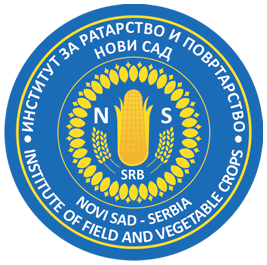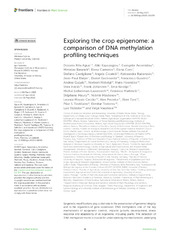Prikaz osnovnih podataka o dokumentu
Exploring the crop epigenome: a comparison of DNA methylation profiling techniques
| dc.creator | Agius, Dolores Rita | |
| dc.creator | Kapazoglou, Aliki | |
| dc.creator | Avramidou, Evangelia | |
| dc.creator | Baranek, Miroslav | |
| dc.creator | Carneros, Elena | |
| dc.creator | Caro, Elena | |
| dc.creator | Castiglione, Stefano | |
| dc.creator | Cicatelli, Angela | |
| dc.creator | Radanović, Aleksandra | |
| dc.creator | Ebejer, Jean-Paul | |
| dc.creator | Gackowski, Daniel | |
| dc.creator | Guarino, Francesco | |
| dc.creator | Gulya, Andrea | |
| dc.creator | Hidvegi, Norbert | |
| dc.creator | Hoenicka, Hans | |
| dc.creator | Inacio, Vera | |
| dc.creator | Johannes, Frank | |
| dc.creator | Karalija, Erna | |
| dc.creator | Lieberman-Lazarovich, Michal | |
| dc.creator | Martinelli, Federico | |
| dc.creator | Maury, Stephane | |
| dc.creator | Mladenov, Velimir | |
| dc.creator | Morais-Cecılio, Leonor | |
| dc.creator | Pecinka, Ales | |
| dc.creator | Tani, Eleni | |
| dc.creator | Testillano, Pilar S. | |
| dc.creator | Todorov, Dimitar | |
| dc.creator | Valledor, Luis | |
| dc.creator | Vassileva, Valya | |
| dc.date.accessioned | 2023-10-02T11:31:56Z | |
| dc.date.available | 2023-10-02T11:31:56Z | |
| dc.date.issued | 2023 | |
| dc.identifier.issn | 1664-462X | |
| dc.identifier.uri | http://fiver.ifvcns.rs/handle/123456789/3777 | |
| dc.description.abstract | Epigenetic modifications play a vital role in the preservation of genome integrity and in the regulation of gene expression. DNA methylation, one of the key mechanisms of epigenetic control, impacts growth, development, stress response and adaptability of all organisms, including plants. The detection of DNA methylation marks is crucial for understanding the mechanisms underlying these processes and for developing strategies to improve productivity and stress resistance of crop plants. There are different methods for detecting plant DNA methylation, such as bisulfite sequencing, methylation-sensitive amplified polymorphism, genome-wide DNA methylation analysis, methylated DNA immunoprecipitation sequencing, reduced representation bisulfite sequencing, MS and immuno-based techniques. These profiling approaches vary in many aspects, including DNA input, resolution, genomic region coverage, and bioinformatics analysis. Selecting an appropriate methylation screening approach requires an understanding of all these techniques. This review provides an overview of DNA methylation profiling methods in crop plants, along with comparisons of the efficacy of these techniques between model and crop plants. The strengths and limitations of each methodological approach are outlined, and the importance of considering both technical and biological factors are highlighted. Additionally, methods for modulating DNA methylation in model and crop species are presented. Overall, this review will assist scientists in making informed decisions when selecting an appropriate DNA methylation profiling method. | sr |
| dc.language.iso | en | sr |
| dc.publisher | Frontiers Media S.A. | sr |
| dc.relation | COST Action CA19125: EPIgenetic mechanisms of Crop Adaptation To Climate cHange (EPI-CATCH) | sr |
| dc.rights | openAccess | sr |
| dc.rights.uri | https://creativecommons.org/licenses/by/4.0/ | |
| dc.source | Frontiers in Plant Science | sr |
| dc.subject | crop epigenome | sr |
| dc.subject | DNA methylation profiling | sr |
| dc.subject | bisulfite sequencing | sr |
| dc.subject | next-generation sequencing | sr |
| dc.subject | immunological techniques | sr |
| dc.subject | mass spectrometry | sr |
| dc.subject | DNA methylation modulation | sr |
| dc.subject | DNA methylation modulation | sr |
| dc.title | Exploring the crop epigenome: a comparison of DNA methylation profiling techniques | sr |
| dc.type | article | sr |
| dc.rights.license | BY | sr |
| dc.citation.rank | aM21~ | |
| dc.citation.spage | 1181039 | |
| dc.citation.volume | 14 | |
| dc.identifier.doi | 10.3389/fpls.2023.1181039 | |
| dc.identifier.fulltext | http://fiver.ifvcns.rs/bitstream/id/9597/Epigeneticki.pdf | |
| dc.identifier.scopus | 2-s2.0-85161895018 | |
| dc.type.version | publishedVersion | sr |


